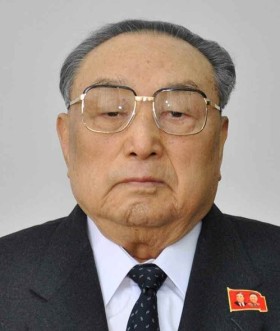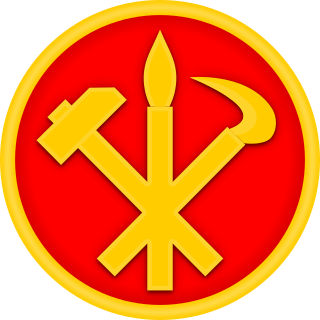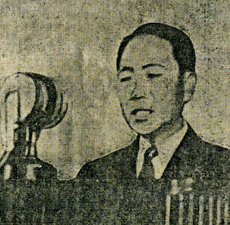
Juche, officially the Juche idea, is the state ideology of North Korea and the official ideology of the Workers' Party of Korea. North Korean sources attribute its conceptualization to Kim Il Sung, the country's founder and first leader. Juche was originally regarded as a variant of Marxism–Leninism until Kim Jong Il, Kim Il Sung's son and successor, declared it a distinct ideology in the 1970s. Kim Jong Il further developed Juche in the 1980s and 1990s by making ideological breaks from Marxism–Leninism and increasing the importance of his father's ideas.

The Korean Central News Agency (KCNA) is the state news agency of North Korea. The agency portrays the views of the North Korean government for both domestic and foreign consumption. It was established on December 5, 1946, and now features online coverage.
The Democratic Front for the Reunification of Korea (DFRK), also known as the Democratic Front for the Reunification of the Fatherland (DFRF) or the Fatherland Front, was a North Korean popular front formed on 22 July 1946 and led by the Workers' Party of Korea (WPK). It was initially called the North Korean Fatherland United Democratic Front.

The Down-with-Imperialism Union was allegedly founded on 17 October 1926 in Hwatian County, Kirin, China, in order to fight against Japanese imperialism and to promote Marxism–Leninism. It is considered by the Workers' Party of Korea to be its root and foundation and its creation is celebrated every year.

Hwang Jang-yop was a North Korean politician who served as the Chairman of the Supreme People's Assembly from 1972 to 1983 and was largely responsible for crafting Juche, the state ideology of North Korea. He defected to South Korea in 1997, the highest-ranking North Korean to have defected.

Songun is the "military-first" policy of North Korea, prioritizing the Korean People's Army in the affairs of state and allocation of resources. "Military-first" as a principle guides political and economic life in North Korea, with "military-first politics" dominating the political system; "a line of military-first economic construction" acting as an economic system; and "military-first ideology" serving as the guiding ideology.

The Workers' Party of Korea (WPK) is the sole ruling party of the Democratic People's Republic of Korea, commonly known as North Korea. Founded in 1949 from the merger of the Workers' Party of North Korea and the Workers' Party of South Korea, the WPK is the oldest active party in Korea. It also controls the Korean People's Army, North Korea's armed forces. The WPK is the largest party represented in the Supreme People's Assembly and coexists with two other legal parties that are completely subservient to the WPK and must accept the WPK's "leading role" as a condition of their existence. The WPK is banned in the Republic of Korea under the National Security Act and is sanctioned by the United Nations, the European Union, Australia, and the United States.
The Respected Comrade Supreme Commander Is Our Destiny is a 2008 North Korean film, described by the North Korean State news agency KCNA as a "documentary film".

Kim Yong Ju was a North Korean politician and the younger brother of Kim Il Sung, who ruled North Korea from 1948 to 1994. Under his brother's rule, Kim Yong Ju held key posts including Politburo member in the Workers' Party of Korea (WPK) during the 1960s and early 1970s, but he fell out of favour in 1974 following a power struggle with Kim Jong Il. From 1998 until his death in 2021, he held the ceremonial position of Honorary Vice President of the Presidium of the Supreme People's Assembly (SPA), North Korea's parliament.
The Juche faction, also known by its Korean name Juchesasangpa and Korean abbreviation Jusapa, was a political faction within South Korea's student movements that supported the North Korean political ideology known as Juche. It was most prominent during the pro-democracy demonstrations of the 1980s and was part of the wider National Anti Juche.
Lim Su-kyung is a South Korean activist and politician. She is best known for attending the 13th World Festival of Youth and Students, held in North Korea and praising President of North Korea Kim Il Sung in 1989, without first obtaining travel permission from the South Korean government. She attended the festival representing the student organization Jeondaehyop (전대협), now known as Hanchongryun. Upon her return to South Korea, she was arrested and sentenced to twelve years in prison, later commuted to five years of which she served three.

The National Reunification Prize is an award of North Korea, bestowed by the Presidium of the Supreme People's Assembly upon people who have contributed to the reunification of Korea. The award was instituted in 1990.

The 6th Congress of the Workers' Party of Korea (WPK) was held in the February 8 House of Culture in Pyongyang, North Korea, from 10 to 14 October 1980. The congress is the highest organ of the party, and is stipulated to be held every four years. 3,062 delegates represented the party's membership; 117 foreign delegates attended the congress, without the right to speak. The congress saw the reappointment of Kim Il Sung as WPK General Secretary and the Presidium of the Politburo established as the highest organ of the party between congresses.

The Order of Kim Jong Il is a North Korean order named after Kim Jong Il, the former leader of North Korea. It is the highest order of North Korea, along with the Order of Kim Il-Sung, and only second to one honorary title, the Hero of Labour.

Ilminism, frequently translated as the One-People Principle, One-People Doctrine, or Unidemism, was the political ideology of South Korea under its first President, Syngman Rhee. The Ilminist principle has been likened by contemporary scholars to the Nazi ideal of the Herrenvolk and was part of an effort to consolidate a united and obedient citizenry around Rhee's strong central leadership through appeals to ultranationalism and ethnic supremacy. In general, "Ilminists" often refers to pro-Syngman Rhee (groups).

The Progressive Party (Korean: 진보당), known as the Minjung Party (Korean: 민중당) until June 2020, is a left-wing progressive and nationalist political party in South Korea. The party was formed by the merger of the New People's Party and People's United Party on 15 October 2017.

Kim Song-hye is a North Korean politician. As the head of the Secretarial Bureau of the Committee for the Peaceful Reunification of the Fatherland (CPRK), she has taken part in numerous negotiations between North and South Korea. She has participated in talks at the 2000 inter-Korean summit, the 15th and 16th North–South Ministerial Talks in 2005, the 2007 inter-Korean summit, and most notably the inter-Korean working level talks of 2013 where she headed the North Korean delegation.

The United Front Department of the Workers' Party of Korea is a department of the Central Committee of the Workers' Party of Korea (WPK) tasked with relations with South Korea. It conducts propaganda operations and espionage and manages front organizations, including the Chongryon.

Yi Sung-yop was a communist activist during the Japanese occupation of Korea and a politician during the early years of the Democratic People's Republic of Korea.

Officially, the Workers' Party of Korea (WPK) – the ruling party of North Korea – is a communist party guided by Kimilsungism–Kimjongilism, a synthesis of the ideas of Kim Il Sung and Kim Jong Il. The party is committed to Juche, an ideology attributed to Kim Il Sung which promotes national independence and development through the efforts of the popular masses. Although Juche was originally presented as the Korean interpretation of Marxism–Leninism, the party now presents it as a freestanding philosophy. The WPK recognizes the ruling Kim family as the ultimate source of its political thought. The fourth party conference, held in 2012, amended the party rules to state that Kimilsungism–Kimjongilism was "the only guiding idea of the party". Under Kim Jong Il, who governed as chairman of the National Defence Commission, communism was steadily removed from party and state documents in favour of Songun, or military-first politics. The military, rather than the working class, was established as the base of political power. However, his successor Kim Jong Un reversed this position in 2021, replacing Songun with "people-first politics" as the party's political method and reasserting the party's commitment to communism.
















